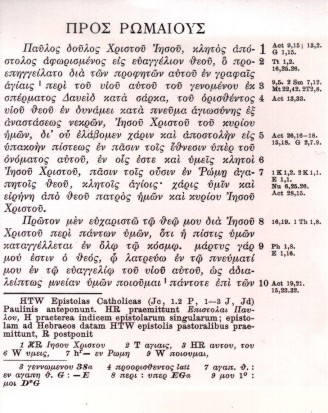| Analysis
of the Bible using perspectives from the sciences and humanities.
|
 |
|
Page
from critical edition of the Greek New Testament
|
The Bible was traditionally
regarded as an expression of timeless truth. Beginning in the seventeenth
and eighteenth centuries, with the rise
of modern science, scholars emphasized that the Bible--like other
books--was conditioned by the historical context in which it was written.
Several lines of critical inquiry developed: (1) Text. Writings
in the Bible were passed down in various forms, in part because the scribes
who copied them made errors or introduced changes into the manuscripts.
Therefore, efforts were made to determine the earliest forms of the biblical
writings. (2) Sources and Editors. Scholars concluded that many
biblical books were based on sources that were revised by later editors.
For example, the gospels were no longer regarded as simple eyewitness
accounts of Jesus' ministry, but as the products of oral and written sources
that were compiled, revised, and edited over a period of time. (3) Reconstructing
History. Biblical narratives were often written years after the events
that they report, and their authors reflect distinctive points of view.
For example, the four gospels present portraits of Jesus that differ in
many respects. Some scholars have tried to reconstruct an account of Jesus'
life by selecting the elements in the gospels that they deem most authentic.
(4) Text and Context. Biblical writings often address specific
contexts. For example, the prophets spoke of injustice in Jerusalem and
other places, while Paul's letters address specific congregations like
Corinth and Philippi. Analysis of the social contexts in which the biblical
authors wrote helps to show the significance of their messages. Sociology,
archaeology, and other disciplines are used to clarify these contexts.
(5) Literary analysis. The Bible includes various kinds of literature
such as stories, letters, and poems. Using perspectives from literary
criticism, scholars analyze features of the Bible such as plot, character
development, and metaphorical language. By the end of the twentieth century,
postmodern scholars challenged the idea that any definitive understanding
of the Bible could be attained.
|